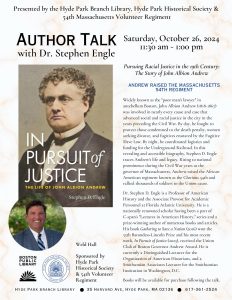News & Events
Author Talk with Dr. Stephen Engle, "Pursuing Racial Justice in the 19th Century: The Story of John Albion Andrew". Join us on Saturday, October 26, 2024, from 11:30am. Widely known as the "poor man's lawyer" in antebellum Boston, John Albion Andrew (1818-1867) was involved in nearly every cause and case that advanced social and racial justice in the city in the years preceding the Civil War. See the Flyer Here.
Meetings are open to the public. To join the society, please go here.
NEW RESOURCES:
How Hyde Park Streets Got Their Names. Frank B. Rich, Esq. Delivered these notes before the Hyde Park Historical Society, May 2, 1898. Published in the Hyde Park Historical Record Vol. III, No. 1, April, 1903, with edits in Italics added in 2024 by HPHS volunteers. View or download the PDF here.
Hyde Park Library History and Images. The Library celebrates its 125th anniversary in September 2024. Our collection includes a history of the library and a selection of images taken over the years. See the collection here.
Women of Hyde Park - Boston Women's Heritage Trail. This walking guide highlights the location of the 1870 Women's march and vote, and the homes of seventeen Hyde Park women, among them suffragists, educators, abolitionists, authors, and businesswomen. View or download the PDF here.
Hyde Park Black History Pamphlet. View or download the PDF here.
Hyde Park Notable
- The 54th Massachusetts Volunteer Infantry Regiment were trained at Camp Meigs in Readville. The 54th was one of the first official African American units in the US armed forces, which saw extensive service in the Union Army during the Civil War. Read Camp Meigs and the 54th
- Hyde Park played an early role in the advancement of women’s voting rights, when in 1870, 47 Hyde Park women, led by the Grimke sisters, flouted the law of the land and voted in an election—50 years before the 19th Amendment gave women the right to vote in 1919. Read 1870 Women's March and Vote

